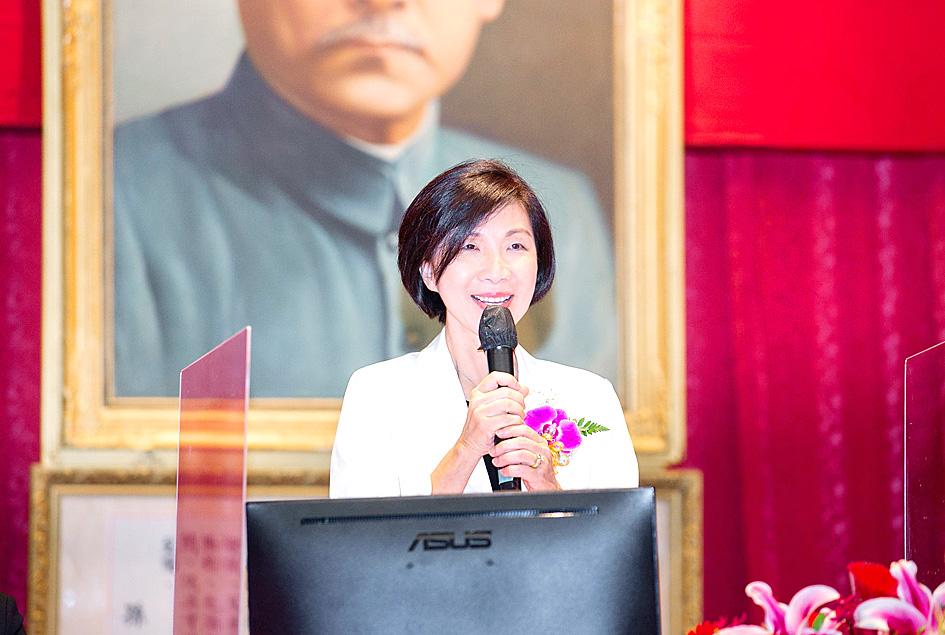Far EasTone Telecommunications Co (遠傳電信) yesterday said it has no intention to engage in a price war after Taiwan Star Telecom Corp (台灣之星) recently offered deep discounts to attract 5G subscribers.
Taiwan Star last month rolled out a NT$599 (US$20.16) per month plan for unlimited 5G data services, saying that the package was a 42 percent discount compared with the NT$1,399 other telecoms charge for a similar service.
“When competition heats up, people will come up with various approaches to cope. At the end of the day, they have to calculate if offering lower prices will enable them to keep turning a profit,” Far EasTone president Chee Ching (井琪) said.

Photo courtesy of Far EasTone Telecommunications Co
Taiwan Star and Asia Pacific Telecom Co (亞太電信) are offering cheaper plans to attract subscribers and expand their market shares, but such a strategy would prove futile as companies seek merger-and-acquisition deals to survive, given insufficient bandwidth and network coverage, as well as unsatisfied subscribers, Ching said.
Far EasTone has submitted applications to the National Communications Commission and Fair Trade Commission to merge with Asia Pacific Telecom in a share swap worth about NT$24.7 billion, Far EasTone said.
Taiwan Mobile Co (台灣大哥大) is seeking to acquire Taiwan Star for NT$28.2 billion.
“I believe the competition will be healthier and normal, since the three existing companies will be of similar size,” Ching said. “For consumers, price is not the only consideration... We will not compete irrationally.”
With the launch of a NT$499 rate plan for unlimited 4G services in 2018, the ensuing price war among local telecoms led to declining revenue for three consecutive years.
Separately, Far EasTone’s shareholders yesterday approved the distribution of a cash dividend of NT$3.25 per share, including a portion from its surplus capital. That represented a payout ratio of 116 percent compared with last year’s earnings per share of NT$2.8.

In Italy’s storied gold-making hubs, jewelers are reworking their designs to trim gold content as they race to blunt the effect of record prices and appeal to shoppers watching their budgets. Gold prices hit a record high on Thursday, surging near US$5,600 an ounce, more than double a year ago as geopolitical concerns and jitters over trade pushed investors toward the safe-haven asset. The rally is putting undue pressure on small artisans as they face mounting demands from customers, including international brands, to produce cheaper items, from signature pieces to wedding rings, according to interviews with four independent jewelers in Italy’s main

Macronix International Co (旺宏), the world’s biggest NOR flash memory supplier, yesterday said it would spend NT$22 billion (US$699.1 million) on capacity expansion this year to increase its production of mid-to-low-density memory chips as the world’s major memorychip suppliers are phasing out the market. The company said its planned capital expenditures are about 11 times higher than the NT$1.8 billion it spent on new facilities and equipment last year. A majority of this year’s outlay would be allocated to step up capacity of multi-level cell (MLC) NAND flash memory chips, which are used in embedded multimedia cards (eMMC), a managed

Japanese Prime Minister Sanae Takaichi has talked up the benefits of a weaker yen in a campaign speech, adopting a tone at odds with her finance ministry, which has refused to rule out any options to counter excessive foreign exchange volatility. Takaichi later softened her stance, saying she did not have a preference for the yen’s direction. “People say the weak yen is bad right now, but for export industries, it’s a major opportunity,” Takaichi said on Saturday at a rally for Liberal Democratic Party candidate Daishiro Yamagiwa in Kanagawa Prefecture ahead of a snap election on Sunday. “Whether it’s selling food or

In the wake of strong global demand for AI applications, Taiwan’s export-oriented economy accelerated with the composite index of economic indicators flashing the first “red” light in December for one year, indicating the economy is in booming mode, the National Development Council (NDC) said yesterday. Moreover, the index of leading indicators, which gauges the potential state of the economy over the next six months, also moved higher in December amid growing optimism over the outlook, the NDC said. In December, the index of economic indicators rose one point from a month earlier to 38, at the lower end of the “red” light.